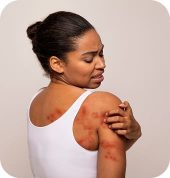We’re here to address the myths about our skin care and give the information you need to keep your hair and skin healthy.
Taking care of our skin is more than just maintaining a youthful glow. It’s important to know the many conditions that can impact us – and not just the ones that come from the sun.
Skin conditions also can look different based on your complexion, and some doctors may not even recognize how they look on different skin tones. Our hair and skin health circle offers culturally-relevant information, expert advice, and a supportive community where individuals can find solutions and share experiences.
When it comes to our health, these six affect our community the most:

PN is a rare, chronic (long-term) skin condition that causes an intense itchy, hard, and crusty rash. A PN rash often appears on the same spot on the arms and legs but can occur anywhere on the body.

HS is a long-term skin condition with an unknown cause; although genetics, hormones, and environmental factors likely play a role. Black and Brown people are more likely to have HS than white counterparts,1 and women are 3x more likely than men to develop this condition.2

Psoriasis is a chronic condition that happens when skin cells multiply too quickly. This causes scaly, itchy, and sometimes raised dark brown or purplish-gray skin patches to appear.

Vitiligo is a skin condition that comes when patches of your skin start to lose color. This loss of color is usually more noticeable on darker skin tones. It can also be permanent and spread over time.

Alopecia can start with the hair falling out in small patches on your head or other body parts, and can come from genetics, stress, or even certain hairstyles. This hair loss can also expose your scalp, so it’s important to know how to care for the areas left uncovered.

Eczema shows up as an itchy and scaly rash with cracked skin, typically found on the face, neck, arms, and legs. Eczema is very common because it can come from things like dry air, irritating soaps, dusty spaces, and more. The most common type is called “atopic dermatitis.”
When we are not included in clinical research, we can’t be sure if a treatment will work just as well or be just as safe for us as it will for other races.
By participating in clinical research, we can give ourselves a chance to have treatments that may work better and be safer for us.
Learning more about clinical research can be a critical step in improving health outcomes for future generations.
If you still have questions, you are not alone.
NOWINCLUDED is a community created for us, by us to:
Join the community built to improve our health.
Special considerations for hidradenitis suppurativa in skin of colour: A review of literature. Journal of the European Academy of Dermatology and Venereology.
Incidence, Risk Factors, and Prognosis of Hidradenitis Suppurativa Across the Globe: Insights from the Literature. Clinical, Cosmetic and Investigational Dermatology.
